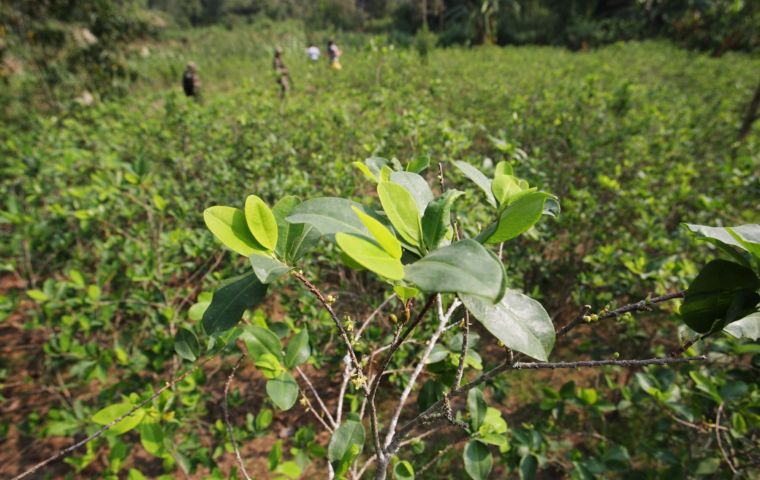MercoPress. South Atlantic News Agency
Bolivia to produce toothpaste made of coca leaves
 In its natural form, coca is not a narcotic and is long linked to Andean traditions
In its natural form, coca is not a narcotic and is long linked to Andean traditions The Bolivian government Tuesday announced the creation of the state-run Empresa Pública Productiva de Industrialización to start the production of a new brand of toothpaste made from coca leaves to fulfill the Constitutional mandate to capitalize on a native and ancestral natural resource, which is the cultural heritage of the country.
Minister of Productive Development and Plural Economy Néstor Huanca Tuesday said the Industrialization of the Bolivian Coca Leaf under the brand Kokabol involved a US$ 9 million investment. The main plant will be located in the municipality of Sacaba, in the department of Cochabamba.
Huanca explained that the toothpaste is expected to generate added value for the benefit of the Bolivian population. Kokabol will process coca leaves to take advantage of their nutritional and medicinal properties, Juanca also explained.
President Luis Arce Catacora said last week that the creation of the company sought to “develop the basic chemical industry of the coca leaf” and “transform and commercialize products derived from it.” The head of state also pointed out that Kokabol will carry out “research and productive technological development of the coca leaf and medicinal plants for their industrialization” as part of the country's import substitution policy.
Under former President Evo Morales, coca use has been a topic of public debate. Morales has long insisted coca was not cocaine and that it belonged to the indigenous cultural heritage, which uses it for medicinal, ritual, and traditional purposes, despite international uproar linking it to drug production purposes.
Bolivia, Colombia, and Peru are known to use coca for cocaine production. However, since the Morales administration, the country decreases its cultivation, according to the United Nations Office on Drugs and Crime (UNODC).
In 2009, the Bolivian Constitution enshrined the Bolivian State as the protector of “native and ancestral coca” as a “factor of social cohesion” that “in its natural state is not a narcotic.”
In January 2010, La Paz temporarily withdrew from the Vienna Convention because one of the articles of that instrument vetoed coca chewing and called for its elimination within a period of no more than 25 years, which implied censorship of this ancestral practice also known as “boleo,” “pijcheo” or “coqueo.”
In 2012, the Bolivian government asked the UN to stop considering labeling coca as dangerous and asked all countries to repair the “historical damage” of having included the leaf in the list of narcotic drugs of the Vienna Convention.
The following year, in July 2013, the first processing factory for this plant was opened in Bolivia, In December of the same year, Bolivia joined the 1961 United Nations Single Convention on Narcotic Drugs, with the reservation of allowing traditional coca leaf chewing throughout its territory. In 2016, chewing of the coca leaf was declared an Intangible Cultural Heritage of the Plurinational State of Bolivia.
In March 2017, the General Coca Leaf Law came into force, to regulate the “revaluation, production, circulation, transport, commercialization, consumption, research, industrialization and promotion of coca in its natural state.” After that, the Bolivian government expanded the area of coca leaf plantations in the country to 22,000 hectares in order to encourage the industrialization of products made from this ancient plant.
However, the UNODC Office warned in 2021 about the growth of illicit coca crops in 2020 and recommended upping the eradication efforts. In this regard, Arce's administration committed to return to Bolivia's international standards and eradicate some 9,000 hectares of illicit crops per year.




Top Comments
Disclaimer & comment rulesCommenting for this story is now closed.
If you have a Facebook account, become a fan and comment on our Facebook Page!